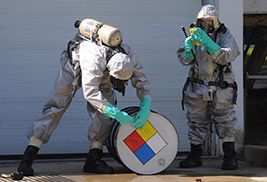Featured Article
Kent State Holds Fall Commencement Ceremonies on Dec. 13 and 14
Kent State University will hold its fall 2013 Commencement ceremonies for the Kent Campus on Dec. 13 and 14.
read moreWorkshop Teaches Students How to Respond to Chemical Spills
Posted Dec. 9, 2013 | Caitlin Potts and Bryan Webb
Participants in the Hazardous Waste Operations and
Emergency Response workshop practice how to respond
to chemical spills. The workshop was organized by Charles
Hart, Ph.D., Kent State University associate professor of
environmental health science.
Kent State University recently held a Hazardous Waste Operations and Emergency Response (HAZWOPER) workshop to teach students and professionals how to respond to chemical spills.
HAZWOPER was organized for the Kent Campus by Charles Hart, Ph.D., Kent State associate professor of environmental health science. Hart has many years of environmental health and safety, emergency planning and hazardous materials experience.
“HAZWOPER was being taught as an academic course at Kent State University at Trumbull,” says Hart. “So, we got Associate Professor Carmen Pompeii, Adjunct Professor Tim Eastly and the Department of Geology that runs the Kent State Trumbull course to participate as instructors for the Kent Campus course.”
Attendees consisted of public sector responders, employers and contractors involved in emerging planning and hazardous material cleanup, as well as Kent State public health students.
The session met the 40-hour in-class requirement needed to certify under the Occupational Safety and Health Administration standards. Along with this, workshop attendees can also earn 30 hours of registered sanitarian credit.
“The course received credit from the Ohio Sanitarian Board,” says Hart. “If you were from the health department, for example, you could get education credit by taking this workshop.”
The course consisted of written work, as well as hands-on training. Students had a final written exam to express what they learned throughout the week. Following the exam, they dealt with a simulated acetone spill. It was up to students to work together and examine the scene, act quickly and respond efficiently.
Dennis Baden, Kent State’s manager of environmental health and safety, was assigned incident commander during the mock acetone spill. This role required him to oversee response actions and work alongside others to assist in fixing the spill.
“Here at Kent State, it’s great to know what to do for the well-being of our community in case something dangerous happens,” says Baden. “However, it’s great to know we plan ahead and do everything in our power to prevent spills from happening in the first place.”
Baden felt the session was beneficial for students and professionals alike.
“As someone who manages environmental issues pertaining to our university, I gained an even better understanding of what the response will be during a chemical spill,” says Baden. “We went over everything from what actions are taken, how far to move people away from hazardous buildings during a crisis and then some.”
The program was sponsored by Kent State’s College of Public Health, the Department of Environmental Health and Safety, Kent State Trumbull and the Department of Geology.
